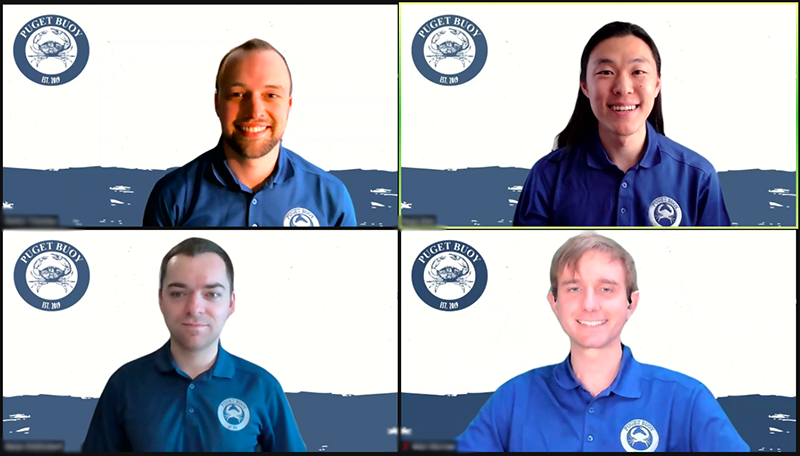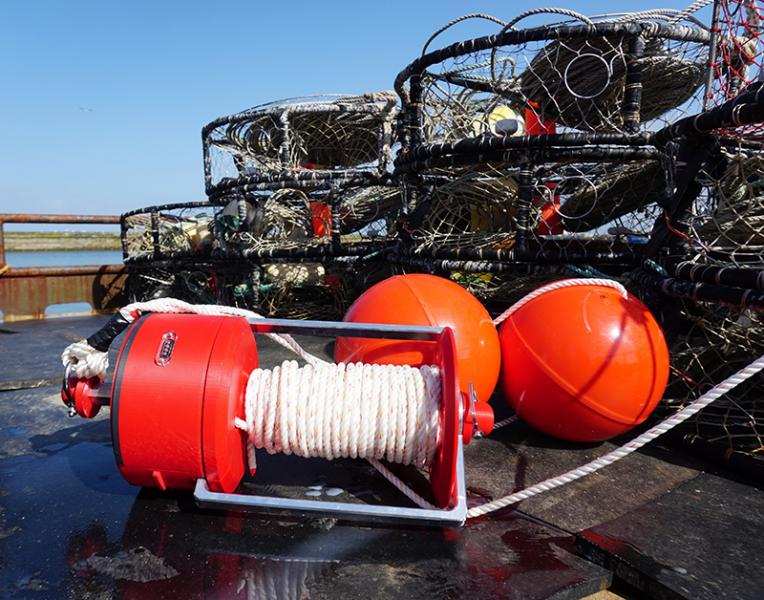
Maritime Blue, a statewide organization of maritime stakeholders, the state Department of Commerce, and the Port of Seattle, has launched its second group of Maritime Innovation Accelerator start-up companies. The goal of the program is to spur new technology and investment in one of Washington’s most enduring and important industry sectors — maritime accounts for over $37 billion in economic impact annually, including some 69,500 jobs.
This series showcases the 11 companies participating in the second wave of the cohort. This time we’re focusing on two startups working to make the maritime industry more sustainable, protect our oceans, and help build a better world.
Virgil Group

Celeste Leroux founded Virgil Group to discover an efficient way to verify that seafood has been legally sourced and meets regulatory traceability requirements. Leroux spent the previous decade working for the federal government on all aspects of ocean policy, including implementing the Seafood Import Monitoring Program, a risk-based traceability program for imported seafood identified as vulnerable to illegal, unreported, and unregulated fishing and/or seafood fraud. She realized that there was no reliable, scalable, and cost-effective way to check the legality of seafood in trade, so she assembled a team to create the solution.
“Verifying the legality of traceable seafood is expensive, difficult, and slow because it is all done manually,” she said. “Today, you have to be multi-lingual expert in fisheries regulations, enforcement, seafood trade, and marine science to evaluate a product’s compliance with regulations, and I don’t think that is a fair or reasonable expectation. It is difficult for industry to do this for even a significant fraction of their purchases, much less all of them, and I realized that there must be some way to automate this process.”
Leroux’s unique expertise made her a natural fit to create a cost-effective solution. She saw that she could have more impact on reducing illegal seafood in trade if she took her expertise from the government side and applied it solving these issues in the private sector. Today Virgil Group offers real world solutions by developing tools, policies, partnerships, and by helping buyers and sellers assess risk of potentially illegal seafood in their supply chains. The startup is currently working on developing software that can instantly verify the legality and traceability of seafood with the hope of releasing the product on the market later in 2021.

Through the Maritime Blue Accelerator Program, Leroux has been able to line up potential testers and clients of her software when the beta version launches at the end of May. She has also learned about options to gain capital through debt, equity and bootstrapping, and how to make educated decisions on growing her company.
“The Maritime Blue Accelerator has given us so many opportunities to talk to entrepreneurs who are willing to share valuable lessons from their successes as well as their failures. From these conversations I’ve learned how to course correct and the value of ‘failing fast’. When time and resources are limited – as they are for a startup – if an idea is not working, you need to assess when it is not going to materialize and move on quickly. It’s helped me look at my young business with new eyes and made us a more resilient company.”
The practice of illegal fishing undermines the sustainability of natural resource management by removing fish not accounted for in stock assessments, as well as the profitability of legal fishing because illegal operators are not paying for permits or potentially other costs, such as fair wages.

“We see Virgil software as the critical bridge between industry and government that empowers companies to buy and sell seafood with confidence as regulations proliferate around the world. It is our way to make a meaningful contribution to sustainable fisheries.”
She said creating a nexus between communities, government, startup, advocacy, and philanthropic community is important for the future of the maritime industry.
“There is an opportunity for synergy we are missing and finding efficiencies I didn’t know were possible. Government can push innovation in a number of ways beyond regulation, for example I’d love to see the Biden Administration prioritize funding to fuel innovation in the oceans startup community."
Puget Buoy

Dylan Diefendorf founded Puget Buoy to explore a solution for the alarming rise in whales that become entangled in fishing gear on the Pacific Coast of North America.
In 2019, as a mechanical engineering student, Diefendorf attended a University of Washington event where representatives from the National Oceanic and Atmospheric Administration (NOAA) discussed ocean-related environmental challenges, including whale entanglements. In 2015, 61 whale entanglements were reported on the West coast, a huge increase from just five to 10 entanglements a year in the early 2010s. These entanglements, which are often fatal, are mostly caused by identifiable fishing gear associated with the west coast’s most valuable fishery – Dungeness Crab. Diefendorf, an entrepreneur and inventor, saw an opportunity to help.
“The ocean is not a very accessible place and trash and marine debris are under reported. It’s hard to clean up,” Diefendorf said.
Today Puget Buoy’s team of four work with crab fishermen and seafood industry stakeholders to develop innovative fishing gear that prevents whale entanglements, reduces the rate at which gear is lost in the ocean, cuts down crabbers' annual gear replacement costs, and improves the health and sustainability of the industry.
The team has also engaged and collaborated with a range of organizations throughout the process, including the Quileute Tribe in Washington State, state and federal representatives, as well as representatives from the crabbing industry.
Commercial and recreational crabbers lose an estimated 10 percent per year of the 500,000 crab pots on the West Coast due to severe weather and vessel strikes. Lost gear costs each commercial crabbing vessel up to $15,000 in replacement costs and $3,500 in the lost potential catch.

The provisionally-patented Puget Buoy system provides crabbers with an affordable alternative that both reduces whale entanglements and prevents gear loss. The timed-release crab pot system keeps crabbing lines out of the water column which means whales can migrate through crabbing waters at a dramatically reduced risk of entanglement (an estimated decrease of 40-88 percent).
Diefendorf said the economic health of the fisheries industry is directly connected to the healthy and sustainability of the ocean.
“Benefiting the ocean really does benefit the industry. The ocean is a very important resource for local economies and economies around the world,” he said. “It’s an opportunity really ripe for making such a change and an important way to ensure viability. The industry does well when the environment does well.”
Puget Buoy successfully tested its first prototype concept in August of 2020 and is currently in the middle of phase two testing on the system.
Diefendorf said his experience in the Accelerator has been helpful as his team continues the development of the startup.
“It’s been helpful in making important introductions and providing insight to see things in a new light,” he said. “Our business plan has also definitely made some improvements since entering Accelerator. We’ve heard from guest speakers on what a financial strategy should look like, how to deliver pitches, develop presentations, and metrics in which start ups need to succeed.”
Puget Buoy recently received first place in the 2021 Alaska Airlines Environmental Innovation Challenge, and was awarded $15,000 that the team plans to use to accelerate the timeline for their pilot project to start in September 2021.









